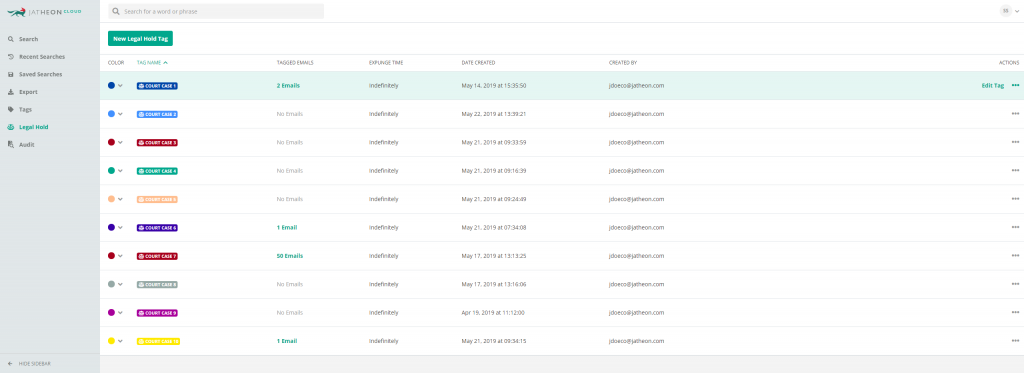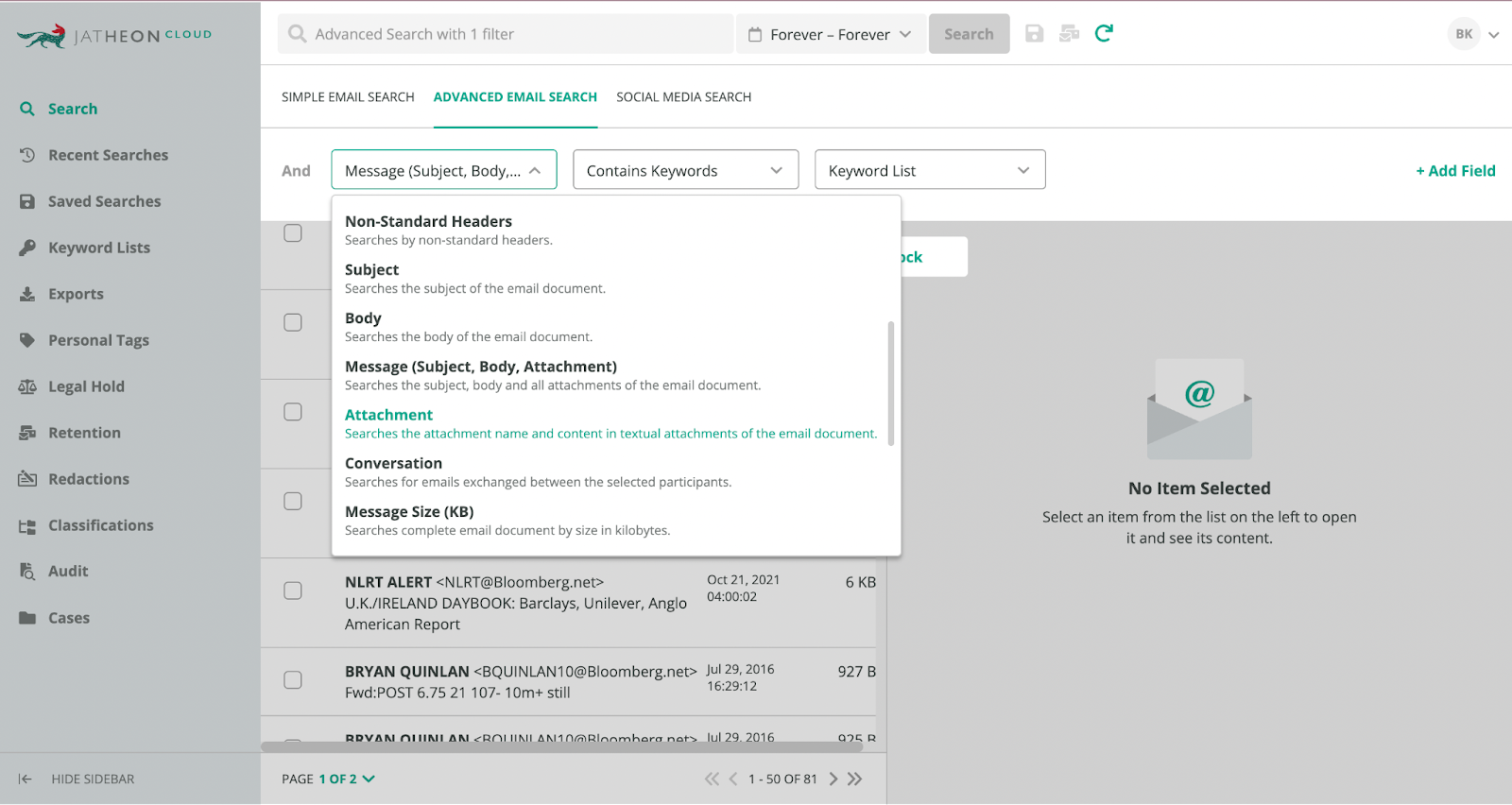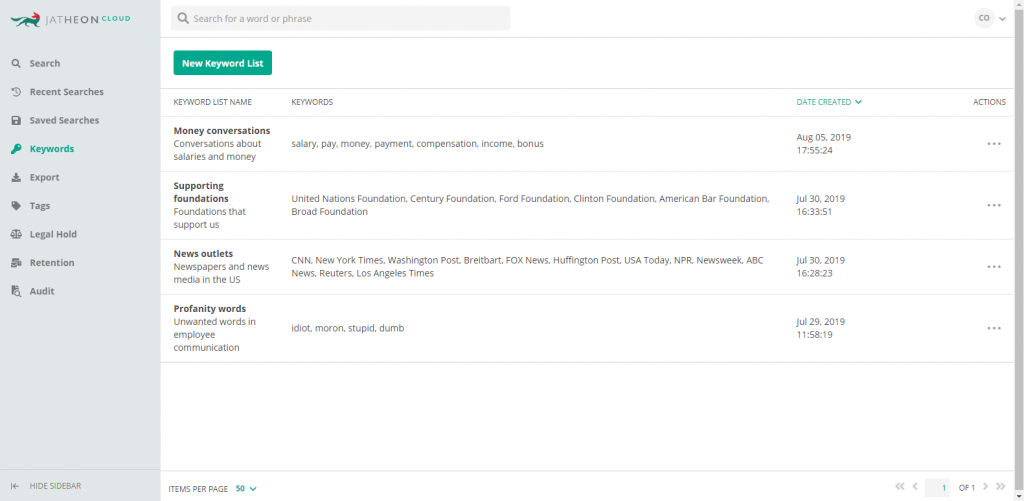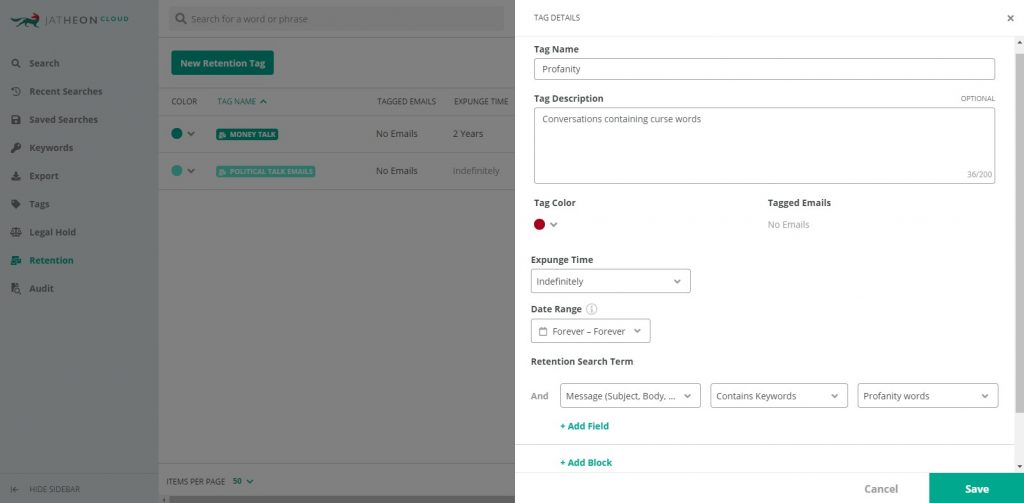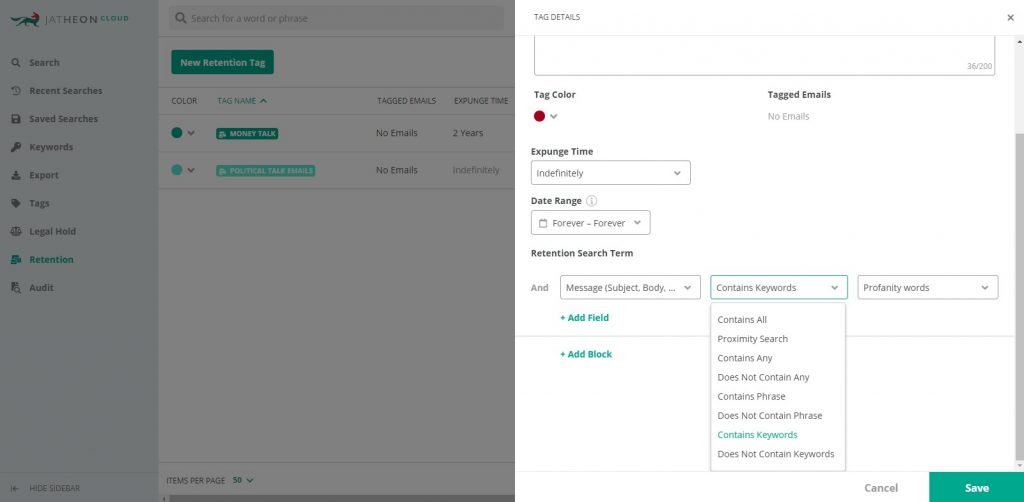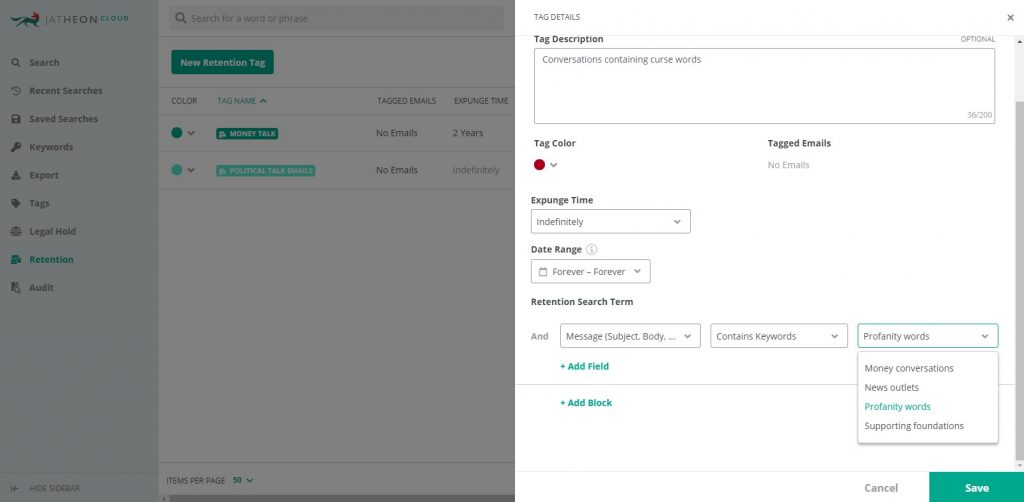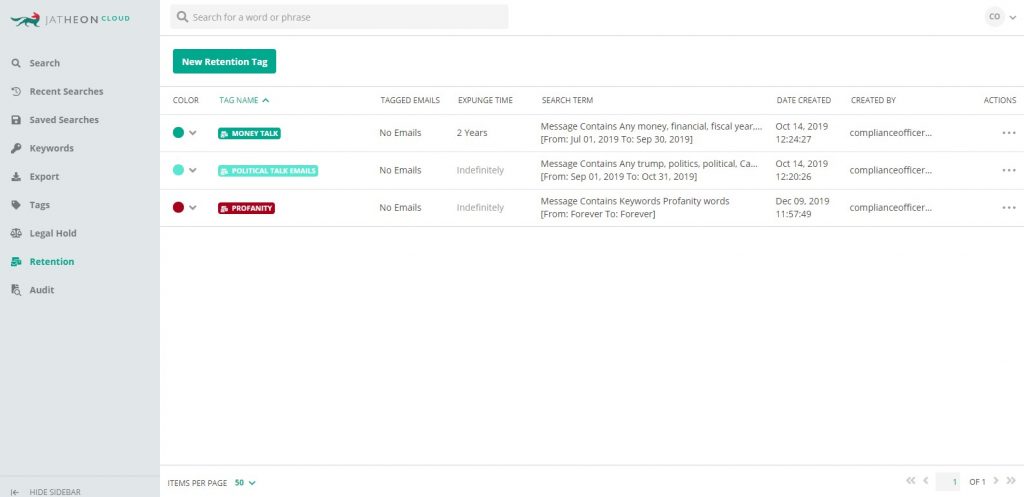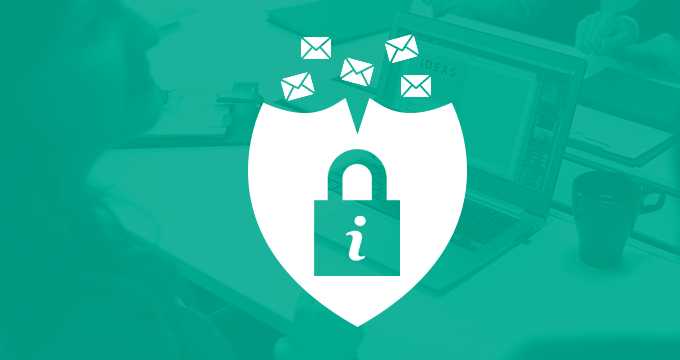In 2025, email still plays a central role in modern business. It’s used to share information, discuss decisions, send business documents, and communicate changes. This brings us to the issue of email retention — emails are important documents that need to be retained just like any other business record.
Organizations use email archiving solutions to ensure that their emails are retained in accordance with relevant legal and regulatory requirements.
However, additional measures are necessary to maintain email record compliance. A key component is establishing a comprehensive email retention policy.
To help you understand email retention requirements and stay compliant with all the relevant privacy and data-retention regulations, this blog post will cover:
- What is an email retention policy, and why it’s essential to implement it
- How long your organization should keep emails archived
- Key email retention policy best practices
- What are the repercussions of non-compliance
What Is an Email Retention Policy?
An email retention policy (ERP) is a company procedure defining how long email messages have to be retained within an archiving solution before they are permanently deleted. This policy serves as legal protection and acts as proof of communication if needed in court cases or to satisfy various governmental and industry regulations.
A company can have multiple email retention policies, as well as separate email deletion and archiving policies. These policies can even differ in how long emails are retained or have different rules for different departments.
Defining how long your company will keep email communication can prove more challenging than you initially thought.
The Importance of Email Retention Policies
There are many reasons to implement an email retention policy in your organization. Some of them are:
- Legal compliance. As most organizations need to comply with state and federal laws, email retention policies safeguard you against legal vulnerabilities. They ensure you are compliant with data protection laws and won’t get penalized.
- Legal investigation. Email plays a significant role in any legal dispute as it is the most used communication channel. A well-structured policy allows you to retain important emails and discover them quickly.
- Data management. Email retention policies safeguard critical business documents and other vital information from loss, ensuring efficient retrieval and organized data management.
- Reputation and trust. Effective email management demonstrates responsibility and builds trust with customers, legal entities, and stakeholders.
- Risk mitigation. Email retention policies minimize any potential legal and financial risks due to email mismanagement.
How Long Should Your Email Retention Policy Be?
Determining the length or timespan is a very important factor when creating an email retention policy, as it influences how much storage and resources you need and how the internal policies will be followed.
There isn’t a one-size-fits-all solution to the perfect length as it’s regulated by three key factors.
- Legal and regulatory email retention requirements. Laws regulating how long certain emails must be retained.
- Different industry standards. Best practices determine how long emails should be retained within a specific industry.
- Specific business needs. Operational needs for effective communication and collaboration.
The most important factor of the three being legal regulations.
The following table outlines the major US laws and their prescribed email retention periods:
| Who It Applies To | Regulation/Regulatory Body | Retention Period |
| All Industries | Internal Revenue Service (IRS) | 7 years |
| All (Government + Education) | Freedom of Information Act (FOIA) | 3 years |
| All public companies | Sarbanes-Oxley (SOX) | 7 years |
| Education | FERPA | 5 years |
| Financial | Gramm-Leach-Bliley Act (GLBA) | 7 years |
| Financial (Banking) | FDIC | 5 years |
| Financial (Brokers, dealers, investment bankers, securities firms) |
FINRA, SEC 17a-4, SEC 17a-3 | 6 years |
| DOD contractors | DOD 5015.2 | 3 years |
| Credit card companies | PCI DSS | 1 year |
| Healthcare | HIPAA | 7 years |
| Pharmaceutical | FDA | 2 years |
| Telecommunications | FCC | 2 years |
In the end, there are both positives and negatives to having longer or shorter retention policies.
For instance, longer retention policies allow you to keep much older emails and have better business continuity. Still, they can expose your data to unauthorized access and take up more resources.
On the other hand, shorter retention policies are cheaper to implement and maintain and reduce the chances of being caught up in legal investigations focused on emails, but they risk violating various regulations in many industries.
Now that you understand the what, why, and how long email retention policies need to be, let’s get into the best practices you should employ.
Email Retention Policy Best Practices
If you aren’t sure where to start with email retention policies, or you already have one but want to make it better, follow these best practices.
1. Create a retention policy tailored to your organization
As already mentioned, there’s not a single email retention policy you can copy that will fit every industry and keep you compliant.
The worst thing you can do is ignore creating an email retention policy and hope your employees manage their own emails and important records. You will find yourself in trouble when the need for these emails arises, and you won’t be able to restore them.
To create your email retention policy follow this process:
- Identify stakeholders. Determine who in your organization will be involved in creating the policy. Key stakeholders are usually representatives from legal, finance, compliance, IT, data management, and similar roles.
- Understand legal and regulatory requirements. Conduct research to identify specific regulations that apply to your industry and determine the length of your policy and data needed to be archived. (Refer to the above table)
- Define the objectives and retention period. After researching everything, outline why you are retaining emails and for how long.
- Classify email data. Categorize emails based on their importance, sensitivity, and regulatory implications. This classification will help in setting appropriate retention periods for each category.
- Create procedures. Determine how you will retain emails, where they will be archived, which software you will use, how often you will review the data, and what to do in case of breaches and data loss.
- Legal review. Pass your policy to the legal team for review and change it depending on the feedback.
- Implement the policy. Once everything is finished, it’s time to start implementing the policy in your organization and training your employees on what it means for them.
With your email retention policy created, you can move on to improving it and implementing additional best practices.
2. Utilize an email archiving solution
After defining your email retention policy, you will need to start tracking and retaining outbound, inbound, and internal email communication.
The job of controlling email access, tracking how the policy is applied, and preserving emails for a long time is very challenging. Making sure the policy is being followed is almost impossible to do manually.
That’s where email archiving solutions like Jatheon help you automate key processes and fully eliminate the possibility of human error or intentional employee misconduct.
Email archiving solutions allow you to define email retention policies based on various criteria, such as the type of data, regulations, and department preferences, and even create multiple retention policies.
The biggest benefit is the cost-effective process of archiving emails on a cloud platform that retains them for as long as necessary and automatically deletes them after the retention period expires. This means no manual work for you after creating the policy.
Going even further beyond, software like Jatheon automatically retains emails that match a certain policy and allows you to search for emails for that specific policy, which is easy with its advanced filters.
3. Use email retention policies to proactively monitor communication
Your email archiving software can also help your compliance and HR teams track employee misbehavior or prevent the sharing of sensitive business information, which might cause legal issues.
This can be accomplished by creating internal company policies and rules that can be used to control specific professional guidelines.
For example, if you want to ensure your employees aren’t using foul language while communicating, the software can monitor conversations and notify you of inappropriate words. This can be accomplished by following this process in Jatheon:
- You’ll first need to create a keyword list of inappropriate words. Here’s a list of common foul words that you can copy-paste into your software.
- Once you’ve created the keyword list, go on to create a retention policy or a rule. On Jatheon Cloud, this is done through retention tags, where you’ll be able to define the tag name (Profanity), the time when the emails can be deleted (here it’s set to indefinitely, which means that they will remain the archive forever), and specify the date range.
- If you’re scanning for curse words in the entire email (subjects, message body, and attachments), you can choose the Message criterion under Retention Search Term and then choose the keyword list you’ve created. Confirm by clicking the Save button.
- You’ll then be able to see the list of all retention tags you have created so far, including Profanity.
Your email archiving solution will automatically retain emails that match the policy by scanning emails for these keywords, and notify admins or compliance officers in case a rule is broken.
Other practical examples of proactive monitoring through retention policies can be the scanning of electronic communication for credit card or social security numbers.
4. Think beyond email retention and archiving
Although almost 63% of business professionals prefer email communication when talking about business-critical information, not all communication happens over this medium. Its dominance is waning with each generation, and it no longer serves as the sole method of communication.
This means that there’s a lot of information being passed around alternative channels like social media and mobile messages. This information is very critical for an organization to stay compliant and use it in legal cases.
It’s very important to apply your retention policies to all other communication channels your organization uses, which can be challenging as this means you need to manage more than just emails.
Luckily, there are solutions like Jatheon that help you archive all of your channels, including:
The best part is that everything is displayed in one user interface, together with your email.
This allows you to utilize email archiving features on other channels and create different policies for different communication platforms.
5. Regularly inform your staff, enforce, and update your policy
It is crucial that the email retention rules are applied across all departments and at every level of the business. An email retention policy only works if it’s applied consistently to the whole organization.
Once you have an email retention policy in place, you need to make sure all of your employees are aware of it. Communicate the rules directly to the staff and include the retention policy in the staff handbook for new hires.
As industry regulations evolve and the effectiveness of your policy may change over time, regularly review and update your email retention policy to ensure its continued relevance and efficacy.
When you have a policy and an informed workforce, you need to ensure that the policy is followed. That means that email retention needs to be monitored at all levels, and employees must be responsible for managing sections of the company.
6. Have a plan in place for legal holds
Most don’t think about them as they rarely happen, but having a plan for handling legal holds is very important to your retention and compliance.
Litigation holds require you to preserve data like emails and other communication when litigation is anticipated or pending. They are a mandatory obligation for your organization to stay compliant.
Your plan should designate responsibility, establish communication procedures for notifying stakeholders, and emphasize documentation and removal processes.
All of these procedures can be ensured and sped up with the right legal hold and ediscovery solution that can be incorporated into your email retention policy safeguarding your organization during legal proceedings and demonstrating legal compliance.
Sloppy Policies are More Common Than You Think
Many organizations assume their email retention policies are effective until they face an ediscovery request or compliance audit and realize they can’t produce the required records.
This is often due to inconsistently applied or outdated retention rules, along with the lack of proper archiving systems. Without a reliable way to manage the lifecycle of email data, businesses face compliance violations, legal exposure, and inflated operational costs.
In fact, out of 80% of companies report having defined data retention policies, only 33% consistently enforce data disposal timelines. This gap leads to over-retention, increased storage costs, and inefficient legal response efforts.
The cost of getting this wrong is significant. According to the American Bar Association, document review accounts for over 80% of total litigation spend, equivalent to approximately $42 billion per year. Much of this cost stems from the need to manually search through massive volumes of disorganized or irrelevant data.
These challenges are avoidable. A strong, well-maintained email retention policy, paired with dedicated archiving software, ensures that only relevant data is retained, securely stored, and readily accessible when needed.
If you haven’t audited your policy recently, now is the time. Simply having a documented and enforced email retention policy puts your organization ahead of many others still operating without one.
Stay compliant, speed up your ediscovery, and retain all of your business data in one easy-to-use solution for businesses of all sizes. To learn how you can easily create custom email retention policies and archive your email communication with Jatheon’s cloud archiving solution, contact us at sales@jatheon.com or book a demo.
Summary of the Main Points
- Despite the popularity of new communication methods, email remains central in business for information sharing and documentation.
- Similarly to other business records, retaining emails is critical for compliance and data management.
- Organizations use email archiving solutions to meet legal and regulatory requirements, but comprehensive retention policies are also essential.
- Proper retention policies protect against legal risks, support data management, and maintain organizational reputation.
- Factors influencing retention duration include legal requirements, industry standards, and specific business needs.
- To stay compliant, tailor your email retention policy to organizational needs, regularly update and enforce it, implement archiving solutions,
- keep all staff informed, and ensure the policy is consistently applied and updated in line with evolving regulations.
- Extend retention practices beyond email to other communication platforms for comprehensive compliance.
FAQ
What is a standard email retention policy?
A standard email retention policy stipulates the guidelines for how long emails should be retained before deletion. It varies by organization and industry but typically ranges from one to seven years, depending on legal, regulatory, and business requirements.
What is the federal law on email retention?
Federal laws on email retention vary by industry. Key regulations include the Sarbanes-Oxley Act (SOX), the Health Insurance Portability and Accountability Act (HIPAA), and the Gramm-Leach-Bliley Act (GLBA.)
What is the legal hold in email archiving?
A legal hold in email archiving is a process used to preserve all forms of relevant information when litigation is anticipated. It ensures that emails and other communications are not deleted or altered during legal proceedings. This is critical for compliance and helps organizations manage and produce required data for discovery in legal cases.
What happens to emails after the retention policy?
After the retention policy period expires, emails are typically deleted or archived based on the organization’s policy. This process helps manage storage, maintain compliance, and protect sensitive information by ensuring that only necessary data is retained.
What are the risks of not having a well-defined email retention policy?
The lack of a policy can lead to legal penalties for non-compliance, difficulties in legal discovery, and inefficient data management. It also increases security risks and potential reputational damage.
How often should an email retention policy be reviewed and updated?
An email retention policy should be reviewed at least annually and whenever there are changes in regulations, industry best practices, or significant business operations. Regular updates ensure its continued effectiveness and compliance.
Read next:Why Your Information Governance Strategy Must Start with Email Top 5 Email Archiving Software Features |

